Eggs are great dietary sources of iron. An egg contains about 0.84 mg of iron or 5% of the recommended daily intake! Almost all iron is found in the yolk, Although, eggs contain heme iron, they have a low bioavailability of less than 4%. Cooking and growing methods don’t play a significant role in the iron concentrations of eggs.
A diet rich in Iron is crucial
Iron is necessary for life. It’s a key component of hemoglobin; a protein of red blood cells that transfers oxygen from the lungs to the tissues.
Iron supports muscle metabolism and healthy connective tissue. Furthermore, it’s crucial for energy metabolism, cellular functioning, physical growth, neurological development, and the synthesis of some hormones, amino acids, and collagen.[1,2]
Iron deficiency may lead to serious side effects, such as gastrointestinal disturbances, impaired cognition, weakened immune function, fatigue, and low body temperature. Moreover, iron deficiency during pregnancy increases the risk of premature delivery and miscarriage.[3]
Iron deficiency is the most common nutritional deficiency worldwide!
How much iron do we need a day?
The recommended daily intake of iron is 18 mg for women and 8 mg for men. Women require much higher doses due to the menstruation period.
Women older than 51 years require only 8 mg of iron, while pregnant women require 27 mg of iron a day.
Many women of reproductive age have a hard time meeting the recommended daily intake of iron. Hence, women may benefit from taking iron supplements. You’ll find a wide variety of iron supplements on iHerb.
You shouldn’t get more iron than the maximum safe dose, though.
Always consult your healthcare provider before taking any dietary supplement or changing your diet plan.
Is Egg a good dietary source of Iron?
Eggs are great dietary sources of iron. An egg contains about 0.84 mg of iron or 5% of the recommended daily intake! A 3-egg omelet provides 2.5 mg of iron or 14% of the Daily Value.[4]
Should I eat the yolk or white for Iron?
Almost all the iron of the egg is found in the yolk. Egg white contains trace amounts of iron, less than 0.1 mg per large egg.
Keep in mind that during cold storage, the iron of the yolk progressively passes from the yolk to the white.
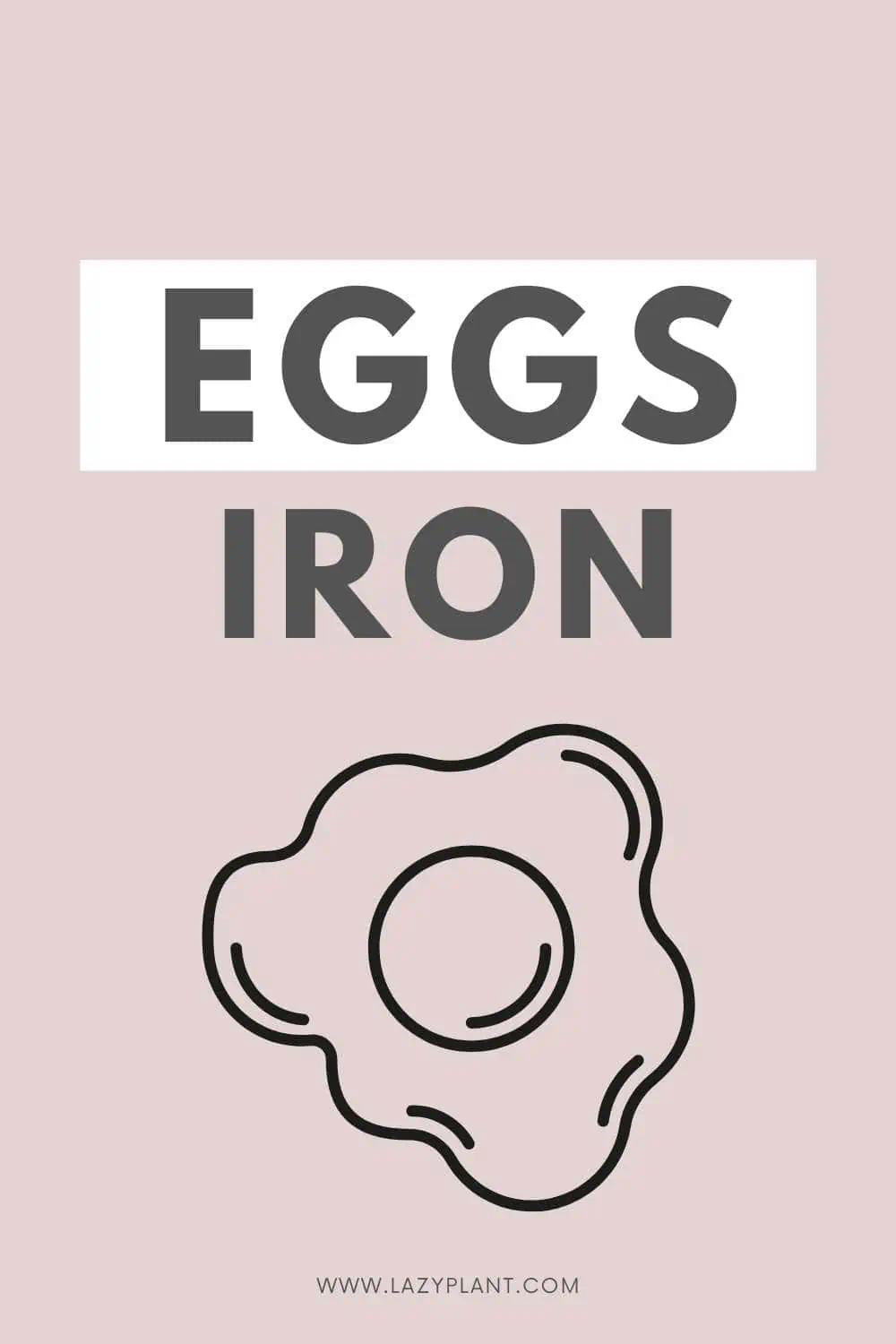
Do darker eggs contain more Iron?
No, the color of an egg’s shell has no correlation with its iron content. Both brown and white eggs contain similar amounts of iron. The color of the shell is determined by the breed of the hen, not by the nutritional content of the egg itself.
Does the eggshell contain any Iron?
No, the eggshell itself does not contain any iron. The eggshell is primarily composed of calcium carbonate, with smaller amounts of other minerals like magnesium, sodium, and phosphorus. The iron content of an egg is found solely within the egg yolk.
For decades eggshells were used for calcium supplements. Consuming them as a fine powder could skyrocket your daily calcium intake. However, you can get decent amounts of calcium from the egg yolk.
Do free-range Eggs have more Iron than the conventional ones?
There is no significant difference in the iron content between free-range and conventional eggs. The iron content of an egg is primarily determined by the hen’s breed and genetics, not by its housing conditions.
Both free-range and conventionally raised hens typically lay eggs with an average iron content of around 0.84 mg per large egg.
Free-range eggs may have slightly higher levels of certain nutrients like omega-3 fatty acids or vitamin D, compared to conventional eggs, the difference in iron content is negligible and not considered a significant factor.
Eggs from certain breeds can have up to 73% more iron, though.[5]
Moreover, researchers managed to increase iron levels in eggs by up to 18% with iron supplementation or by giving diets to laying hens containing organic forms of iron.[6,7,8]
But, it’s an area of research. You won’t find eggs supercharged with iron in your supermarket.
Conventional, organic, or free-range farming methods do not significantly affect the iron content of eggs.
Are organic eggs worth the cost?
While organic eggs often carry a higher price tag, they are not necessarily worth the extra cost solely for boosting your iron intake. Both contain a similar iron content.
If you’re seeking to boost your iron intake, focusing on other dietary sources is far more effective than relying on eggs, regardless of whether they are organic or conventional. Red meat, poultry, fish, certain seafood, beans, fortified cereals, and leafy green vegetables are all excellent sources of iron with significantly higher content compared to eggs.
How much Iron in Eggs do we absorb?
The absorption rate for iron in a typical Western diet is approximately 10-20%. Most healthy people absorb only 1 to 2 mg of iron through the intestinal system.[9]
Eggs primarily contain heme iron, which is generally better absorbed than non-heme iron found in plant-based sources. However, the presence of phosvitin in egg yolks hinders iron absorption to some extent. Mean absorption from eggs has been estimated to be around 3.7%. A protein in egg yolk, called phosvitin, can hinder iron absorption.[10]
Less than 5% of the iron in eggs is absorbed by the body.
Do Vegan egg replacers have any Iron?
The iron content of vegan egg replacers varies depending on the specific ingredients used. However, in general, most vegan egg replacers do not contain significant amounts of iron.
Commercial egg replacers made from various plant-based ingredients, often including starches, flours, and leavening agents. Their iron content can vary significantly depending on the specific recipe and any added iron fortification.
Common vegan egg replacers, like flaxseeds or chia seeds, contain negligible amounts of iron as well.
Can I depend on Eggs for Iron?
No, you cannot depend on eggs for iron. While eggs do contain some iron, it’s not a significant amount and has limitations in terms of absorption:
You should eat more than 20 eggs to meet your daily iron requirements!
How many eggs can I eat a week?
Eggs have a superior nutritional value. They have a few calories, while they’re packed with many vitamins and minerals, like vitamin B12, vitamin D, choline, lecithin, and even omega-3 fatty acids.
But, we should consume eggs in moderation. They’re among the richest foods in cholesterol and have saturated fats, which in high amounts may raise cholesterol and increase the risk of heart disease and stroke.[11]
So, how many eggs can I eat per day? For most healthy adults, 1-2 eggs per day is considered safe and unlikely to negatively impact health. Especially if you follow a balanced, plant-based diet.
Individuals with specific medical conditions or health issues may need to restrict their egg intake based on their doctor’s advice.
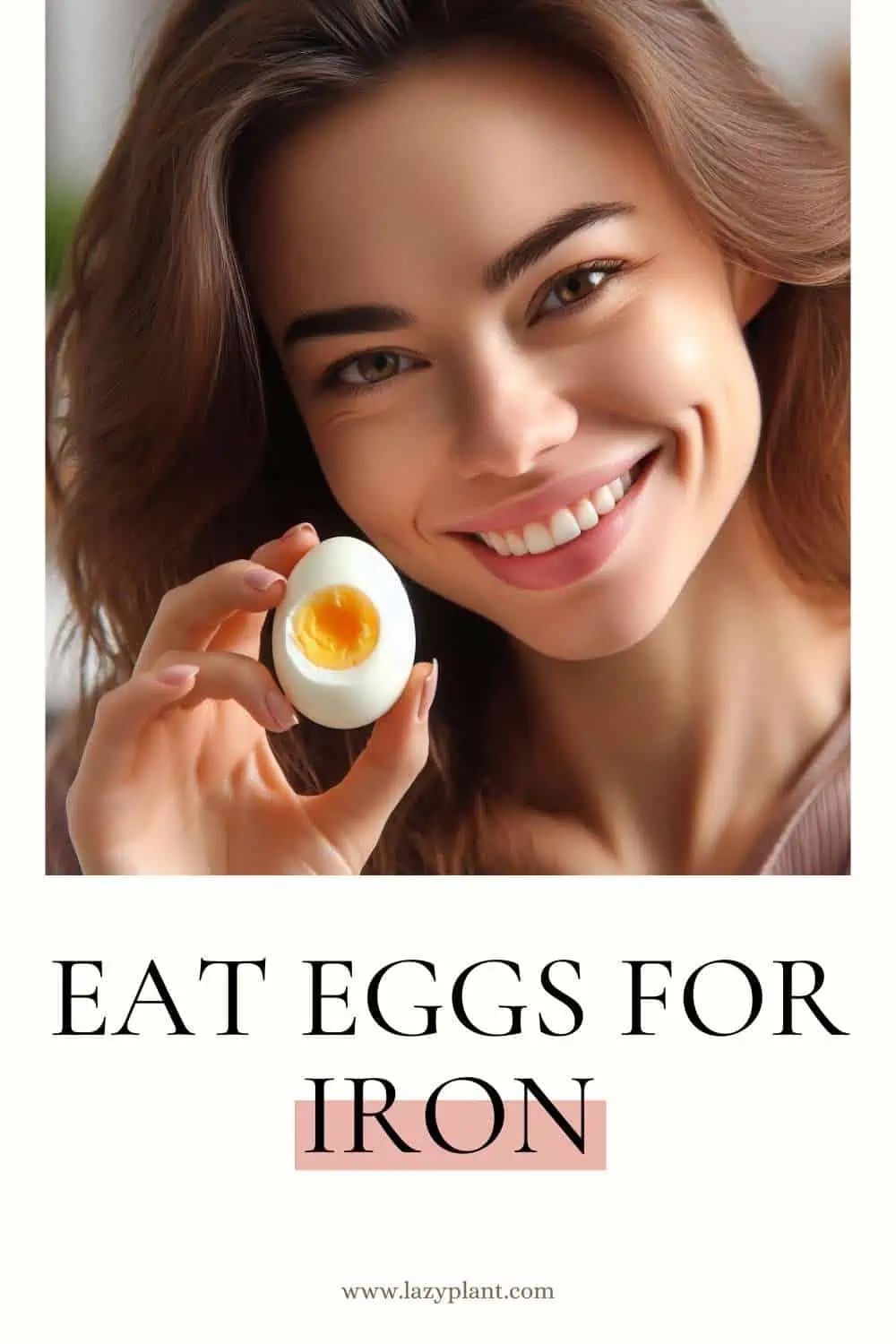
Do Eggs increase your Energy levels?
While eggs contain a small amount of iron, it’s unlikely that their iron content directly impacts your energy levels.
The iron content in an egg is relatively low compared to other dietary sources like red meat, poultry, fish, and legumes. This amount contributes minimally to the daily recommended iron intake, making eggs an unreliable source for significantly boosting energy levels through iron alone.
However, eggs offer various nutrients that contribute to energy production, including:
- Protein provides essential building blocks for cells and tissues, supporting overall body function and metabolism.
- Healthy fats in eggs provide sustained energy and support cell function.
- B vitamins play crucial roles in energy metabolism, helping the body convert food into usable energy. Above all, eggs are among the main dietary sources of vitamin B12 for many people, as it isn’t naturally present in plant-based foods.
Can eating Eggs increase my ferritin?
Ferritin is the storage form of iron in the body. While iron intake can influence ferritin levels, other factors like chronic blood loss, inflammation, and certain medical conditions can also significantly impact ferritin levels. Eggs are not likely to significantly increase your ferritin levels due to their relatively iron content and low bioavailability.
In a recent study on 585 children, the daily consumption of an egg for 6 mo didn’t affect iron status or iron deficiency anemia prevalence.[12]
When should I eat Eggs for treating low levels of Iron?
Focusing on the specific timing of consuming them for boosting iron levels is not as crucial as choosing more effective dietary sources and optimizing absorption. Eat eggs whenever it’s suitable for you. Try to consume eggs with other foods that increase iron absorption.
How to eat Eggs for improved iron status?
Do cooking methods affect Iron concentrations & bioavailability in Eggs?
Cooking methods do not significantly affect the iron concentration in eggs. However, they can have a minor impact on its bioavailability, which refers to the amount of iron your body can absorb and utilize.
- Boiling and poaching: These methods are considered to have minimal impact on iron bioavailability in eggs.
- Frying and scrambling: Cooking eggs at high temperatures, especially for extended periods, may slightly decrease iron bioavailability due to potential interactions with other egg components. However, the overall effect is likely to be small.
Here’s the order of best cooking methods for preserving nutrients in eggs:
1. Poaching and Steaming. Both methods are efficient and quick, minimizing nutrient loss. These methods involve gentle cooking with minimal heat, which helps retain heat-sensitive nutrients like vitamins A, B, and E. Poaching involves simmering eggs in water, while steaming uses steam to cook the eggs.
2. Soft-boiling: Similar to poaching, soft-boiling involves cooking eggs in simmering water for a shorter duration. This method preserves most nutrients while achieving a slightly firmer yolk consistency compared to poaching.
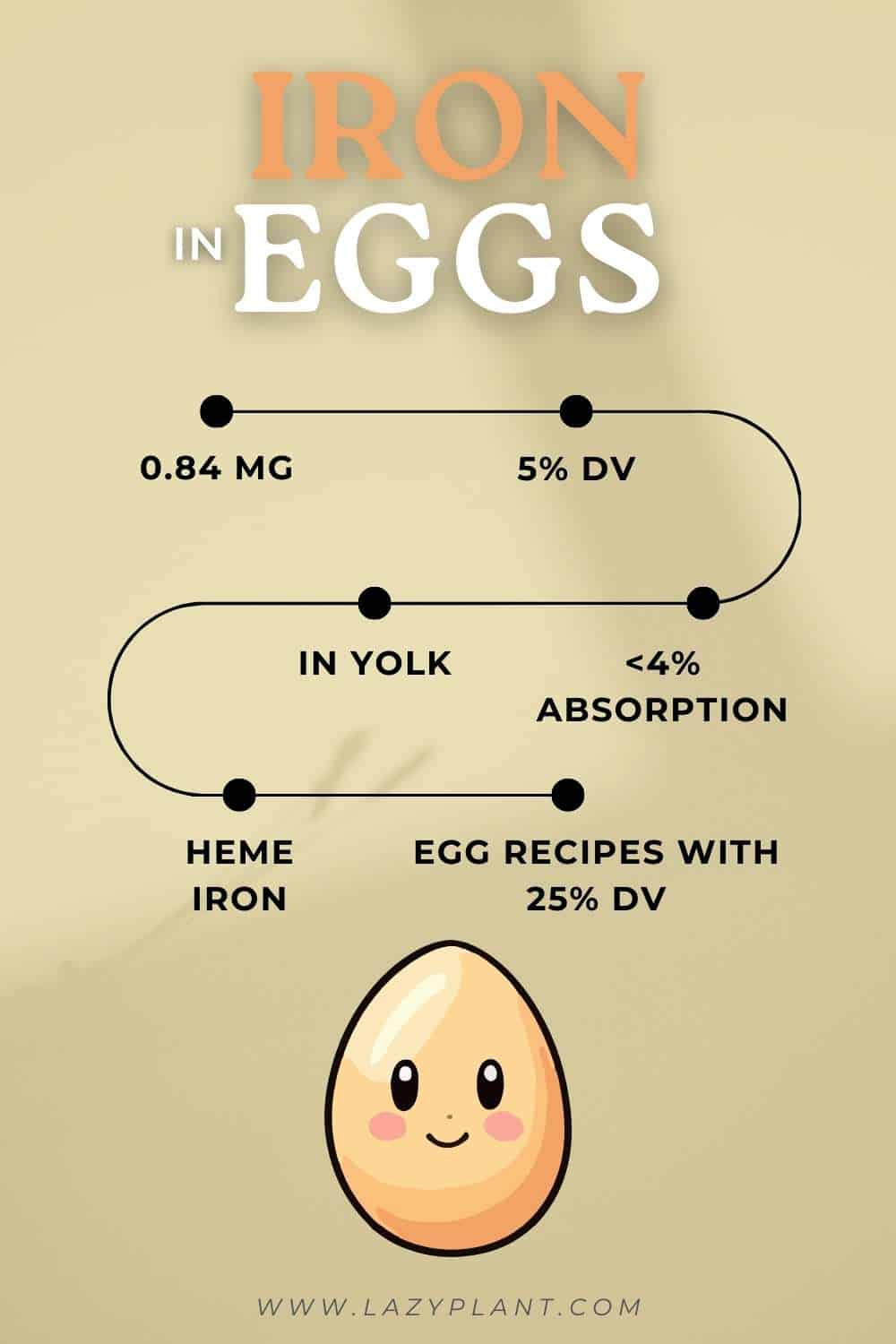
3. Scrambled eggs: While scrambling involves slightly higher heat than poaching or steaming, it’s still a relatively gentle cooking method. The addition of milk or water helps prevent overcooking and nutrient loss.
4. Frying and Hard-boiling: These methods involve higher heat and longer cooking times, which can lead to greater nutrient loss, particularly heat-sensitive vitamins. However, the overall impact on the nutritional value of eggs remains moderate.
Regardless of the method, minimizing cooking time helps preserve nutrients.
Adding excessive fat during cooking can increase calorie intake without significantly impacting nutrient retention. Only eggs without the use of extra fat are good for weight loss.
Benefits of cooking with Cast Iron Cookware!
Cooking with cast iron cookware can increase the total iron content of your meal, but the effect varies depending on several factors. It can have beneficial effects on iron status for both adults and children.[13,14]
Cast iron cookware is made of iron, and during cooking, some of this iron can leach into the food. This process is more pronounced with acidic foods like tomatoes, as they enhance iron solubility.
Studies have shown that cooking in cast iron can increase the iron content of food by up to 16%, as compared to Teflon-coated non-stick pots.[15]
Particularly for acidic foods like tomato sauce, lentils, and meat stews. Hence, you could add tomato sauce and other vegetables to your cast iron pan while cooking your favorite omelet or scrambled eggs!
Longer cooking times generally lead to greater iron transfer.
It’s important to note that not all of the iron leached from the cookware is readily absorbed by the body. The bioavailability of iron in cast iron-cooked food is comparable to non-heme iron found in plant-based sources, which is generally lower than heme iron from animal sources.
Cast iron cookware offers other benefits beyond iron leaching, such as excellent heat retention and even cooking.
On Amazon, you can find a cast iron cookware set under $60!
Craving perfectly cooked eggs? Cast iron can help!
- Heat it up: Start by preheating your skillet over medium heat.
- Grease it up: Add a touch of oil or butter to prevent sticking.
- Scrambled or fried? For scrambled eggs, whisk them in a bowl before pouring them into the hot skillet. Let them set slightly, then gently stir. For fried eggs, crack them directly into the pan and cook until the whites are firm but the yolks are runny (or to your desired level of doneness).
- Seasoning is key: A well-seasoned skillet is essential for preventing sticking.
- Control the heat: Adjust the heat as needed to avoid burning your eggs.
- Flipping finesse: Consider using a silicone spatula for easy flipping.
- Oil options: Experiment with different oils like olive oil or avocado oil based on your taste preference.
The key to mastering eggs in cast iron is proper seasoning and maintaining the right temperature.
Eat Eggs with foods rich in Vitamin C for increased Iron absorption
Try to pair eggs with vitamin C-rich foods, as it enhances the absorption of nonheme iron. Examples of vitamin C-rich foods that can be key ingredients for many egg recipes include tomatoes and bell peppers.
According to a study, drinking orange juice with eggs could enhance iron absorption to 10%.[10]
Since eggs contain heme iron, the impact of vitamin C on egg iron absorption might be less pronounced, but it can still contribute to overall iron absorption from your entire meal.
In addition to vitamin C, meat, poultry, and seafood can enhance nonheme iron absorption.[16]
Avoid eating Eggs with foods that inhibit Iron absorption
On the other hand, better to avoid eating eggs or any other iron-packed food with foods rich in oxalates or polyphenols, as they inhibit the absorption of iron.
For example, spinach is the richest common food in oxalates. Although it’s particularly high in iron, providing 17% DV per serving, we absorb only a small percentage. Thus, it’s a good idea not to add spinach to your omelet.
Whole grains and beans are also high in oxalates.
It’s estimated that we absorb 5-12% of iron from vegetarian diets or 14-18% of iron from mixed diets.
As plant-based foods are packed with iron inhibitors, it’s highly recommended for vegetarians to take 1.8 more iron than people who eat meat.
Calcium might interfere with the absorption of both nonheme and heme iron. Hence, avoid cooking foods packed with iron with dairy products.
Also, better to take calcium and iron supplements at different times of the day!
However, healthy people who follow a well-balanced diet shouldn’t worry about their iron intake. Iron enhancers and inhibitors have little effect on most people’s iron status.
Avoid consuming eggs alongside calcium-rich foods like dairy products or spinach, as they can further hinder iron absorption.
Cook eggs with other foods rich in iron
Common foods high in iron are meat, poultry, fish, legumes, beans, and certain fruits and vegetables.
| Food Category | Food | Iron Content (% DV) | Serving Size |
|---|---|---|---|
| Seafood | Clams, cooked | 17% | 3.5 oz |
| Oysters, raw Eastern | 891% | 3.5 oz | |
| Mussels, cooked | 332% | 3.5 oz | |
| Sardines, canned in oil | 215% | 3.5 oz | |
| Red Meat | Lean beef, cooked | 20% | 3 oz |
| Pork | Lean pork chop, cooked | 14% | 3 oz |
| Other | Dark chocolate (70% cacao) | 18% | 1 oz |
| Beans & Legumes | Tempeh, cooked | 8% | 3 oz |
| Lentils, cooked | 37% | 1 cup | |
| Nuts & Seeds | Pumpkin seeds | 17% | 1 oz |
| Cashew nuts | 9% | 1 oz | |
| Vegetables | Spinach, cooked | 17% | 1 cup |
| Grains | Quinoa, cooked | 16% | 1 cup |
| Beans & Legumes | Black beans, cooked | 15% | 1 cup |
| Kidney beans, cooked | 14% | 1 cup | |
| Chickpeas, cooked | 14% | 1 cup | |
| Fruits | Dried Goji berries | 36% | 1 oz |
| Dried apricots | 6% | 1/2 cup |
Besides beans, you can skyrocket your iron intake by consuming certain fruits and berries, dark chocolate, or potatoes!
My favorite source of iron is quinoa. Quinoa supports weight loss, as it’s among the few vegan protein sources and it’s packed with antioxidant compounds that promote good health and help burn belly fat.
Recipe Ideas with Eggs to boost your daily Iron intake
Breakfast (300-400 calories):
- Scrambled Eggs with Spinach and Feta: Scramble eggs with chopped spinach, crumbled feta cheese, and a sprinkle of red pepper flakes for a protein, vitamin C and iron-packed start. Pair it with a whole-wheat toast for added fiber.
- Egg Muffins with Sausage and Peppers: Preheat oven to 375°F. Sauté diced sausage and peppers, then whisk eggs with spices. Fill muffin tins with sausage mixture and top with egg mixture. Bake for 20-25 minutes.
- Oatmeal with Berries and Sliced Almonds: Combine rolled oats with milk or water, top with sliced almonds, fresh berries, and a drizzle of honey for a nutritious and iron-rich breakfast. Add a hard-boiled egg for extra protein. A meal with oats and eggs has huge benefits for weight loss.
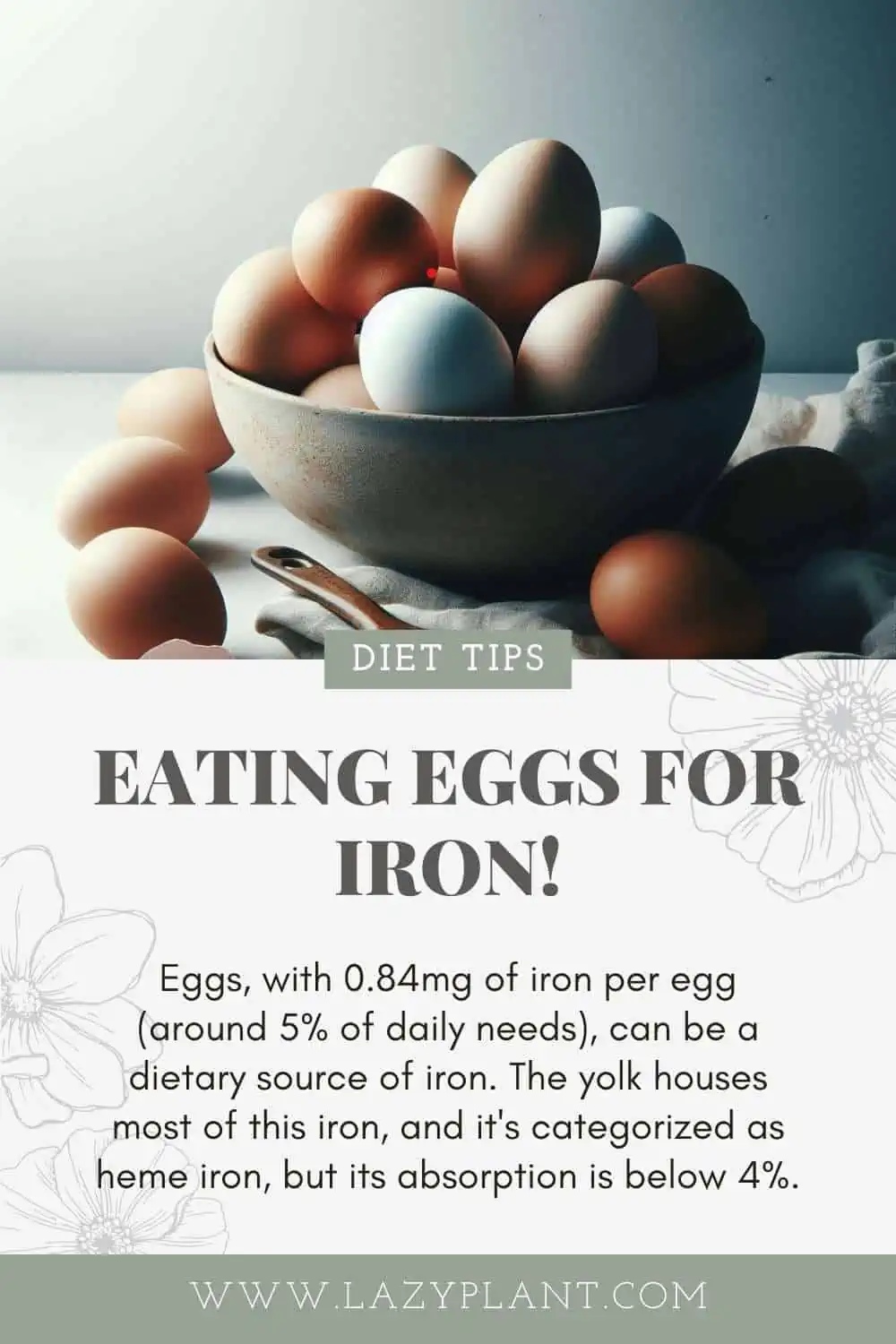
Lunch (400-500 calories):
- Tuna Salad Sandwich on Whole-Wheat Bread: Combine canned tuna with chopped celery, red onion, mayonnaise, hard-boiled eggs, and lemon juice for vitamin C for increased iron absorption. Spread on whole-wheat bread and add lettuce and tomato slices for extra vitamins.
- Lentil Soup with Poached Egg: Prepare lentil soup with your favorite vegetables and spices. Poach an egg on top just before serving for added protein and iron.
- Quinoa Salad with Grilled Chicken, Avocado, and a Fried Egg: Cook quinoa and mix with grilled chicken strips, chopped vegetables like bell peppers and cucumbers, avocado slices, and a lemon vinaigrette dressing. Top with a fried egg for added richness.
Snacks (150-200 calories):
- Hard-boil eggs: remove yolks, and mash with mayonnaise, mustard, and spices. Pipe the mixture back into the egg whites and sprinkle with paprika for a classic and iron-rich snack.
- Egg and Veggie Omelette: Whisk eggs with chopped vegetables like spinach, mushrooms, and onions. Cook in a pan with a drizzle of oil until set. Fold and enjoy.
- Open-Faced Egg and Avocado Toast: Toast a slice of whole-wheat bread. Mash half an avocado and spread it on the toast. Top with a fried or poached egg, sprinkle with chili flakes and drizzle with balsamic vinegar for a flavorful and satisfying snack. Avocado has too many benefits for a lean body.
- Egg Salad on Toast with Sprouts: Hard-boil an egg and mash it with mayonnaise, mustard, chopped celery, and red onion. Spread the mixture on toasted whole-wheat bread and top with fresh alfalfa sprouts for added crunch and nutrients.
- Mini Egg Pizzas: Toast small rounds of whole-wheat bread. Spread a thin layer of tomato sauce on each toast. Top with shredded cheese, chopped vegetables like bell peppers or mushrooms, and a cracked egg. Bake in a preheated oven at 375°F for 10-12 minutes, or until the egg whites are set and the cheese is melted. Enjoy these mini pizzas as a fun and protein-packed snack.
Dinner (500-600 calories):
- Beef and Broccoli Stir-fry with Brown Rice and a Fried Egg: Stir-fry lean beef strips with broccoli florets, bell peppers, and your favorite stir-fry sauce. Serve over brown rice and top with a fried egg for added richness. Broccoli and bell peppers are two of the richest foods in vitamin C, you can eat every day!
- Salmon with Roasted Vegetables, Quinoa, and a Poached Egg: Bake salmon fillets with your favorite herbs and spices. Roast vegetables like Brussels sprouts, asparagus, and sweet potatoes alongside the salmon. Serve with cooked quinoa and top with a poached egg for added protein and iron.
- Chicken Fajitas with Black Beans, Guacamole, and Scrambled Eggs: Marinate chicken strips and sauté with peppers and onions. Serve on warmed tortillas with black beans, shredded cheese, salsa, guacamole, and scrambled eggs for a flavorful and iron-rich option.
Additional Tips:
- Incorporate other iron-rich ingredients like leafy green vegetables, beans, lentils, and fortified cereals throughout your meals and snacks.
- Pair iron-rich foods with vitamin C-rich sources like lemon juice, tomatoes, broccoli, cauliflower, and bell peppers to enhance iron absorption.
- Avoid consuming excessive amounts of calcium-rich foods like dairy products or spinach alongside iron-rich meals, as they can hinder iron absorption.
Feel free to experiment with different flavors and ingredients to create healthy and delicious meals that boost your iron intake.
Do I need Iron Supplements?
In most cases, healthy people who follow a balanced diet do not need iron supplements. They can typically get enough iron from a balanced diet that includes various iron-rich foods.
Heavy menstrual bleeding, regular blood donation, or certain medical conditions like ulcers or gastrointestinal bleeding can lead to iron deficiency and potentially warrant iron supplementation.
Pregnant women have increased iron needs due to fetal development. Prenatal vitamins often contain iron, but additional supplementation might be recommended based on individual needs and blood tests.
Also, people who follow strict vegetarian or vegan diets may be at a higher risk of iron deficiency, especially if they don’t consume iron-fortified foods or plan their meals carefully to include adequate amounts of plant-based iron sources.
Getting your iron levels checked through a blood test is crucial to determine if you need supplementation. Taking iron supplements without a confirmed deficiency can be harmful and lead to iron overload.
Before taking any iron supplements, even if you suspect a deficiency, it’s vital to consult a healthcare professional.
You’ll find a wide variety of iron supplements at unbeatable prices on iHerb.
12+1 Myths for Iron in Eggs
Myth 1: Eggs are a significant source of iron.
Fact: While eggs do contain some iron, they are not considered a primary source for meeting daily iron needs. Other foods like red meat, poultry, fish, beans, lentils, and fortified cereals are much richer in iron.
Myth 2: The color of the yolk determines the iron content of the egg.
Fact: The color of the egg yolk primarily depends on the diet of the hen and does not significantly impact the iron content. Both brown and white eggs contain similar amounts of iron.
Myth 3: Cooking eggs destroys their iron content.
Fact: Cooking methods like boiling, poaching, scrambling, frying, or baking have minimal impact on the iron content of eggs.
Myth 4: Adding iron-rich ingredients to eggs significantly boosts their iron content.
Fact: While adding iron-rich ingredients like spinach or chopped vegetables to eggs can increase the overall iron content of the dish, the contribution from the eggs themselves remains relatively low.
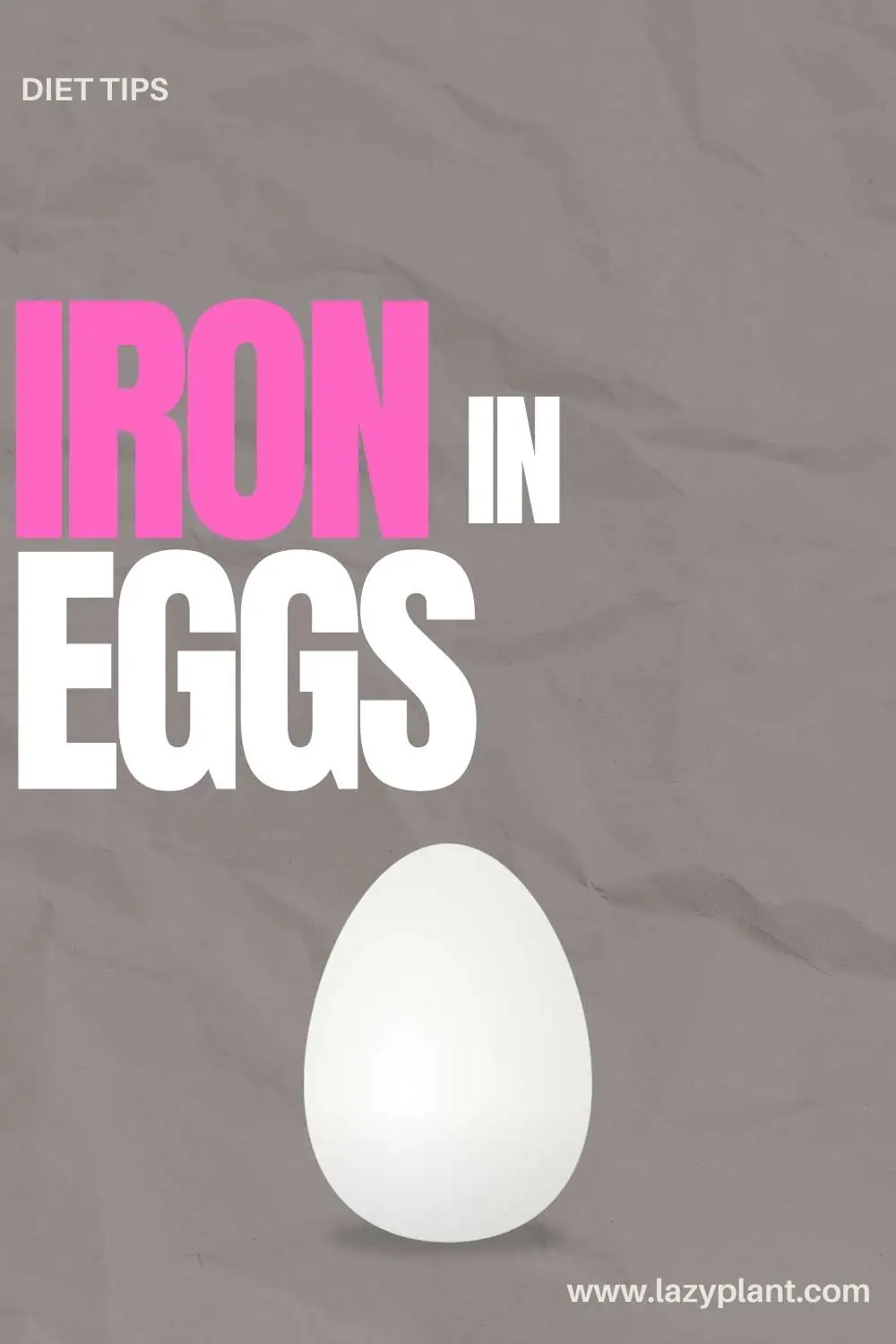
Myth 5: Eggs are bad for cholesterol and should be avoided for optimal iron absorption.
Fact: While eggs contain cholesterol, recent research suggests moderate egg consumption (up to 1 whole egg per day for healthy adults) does not significantly impact heart health for most individuals. Additionally, dietary cholesterol has a minimal effect on iron absorption.
Myth 6: Consuming eggs alongside calcium-rich foods hinders iron absorption.
Fact: This is partially true. Calcium from dairy products or spinach can indeed hinder iron absorption. However, the effect is not substantial, and consuming these foods in moderation alongside eggs shouldn’t be a major concern.
Myth 7: The best time to eat eggs for iron absorption is in the morning.
Fact: The timing of egg consumption has minimal impact on iron absorption compared to other factors like overall dietary intake and the presence of vitamin C.
Myth 8: Only heme iron (from animal sources) is efficiently absorbed by the body.
Fact: While heme iron found in animal sources is generally more readily absorbed than non-heme iron from plant-based sources, consuming vitamin C alongside non-heme iron sources can significantly enhance its absorption.
Myth 9: Children need to consume large amounts of eggs to meet their iron needs.
Fact: While eggs can be part of a child’s diet, they should not be solely relied upon for iron intake. Including diverse iron-rich foods like fortified cereals, meat, poultry, and vegetables is crucial for children to meet their iron requirements.
Myth 10: People who follow vegetarian or vegan diets cannot achieve adequate iron intake.
Fact: While it requires more planning and mindful food choices, vegetarians and vegans can meet their iron needs through a well-balanced diet rich in plant-based iron sources like beans, lentils, tofu, fortified cereals, and leafy green vegetables. Pairing these foods with vitamin C-rich options further enhances iron absorption.
Myth 11: Iron supplements are necessary for everyone to prevent iron deficiency.
Fact: Most healthy individuals can meet their iron needs through a balanced diet. Iron supplements are typically recommended only for individuals diagnosed with iron deficiency anemia or those at high risk, as excessive iron intake can be harmful.
Myth 12: Cooking eggs in cast iron cookware significantly increases their iron content.
Fact: While cast iron cookware can leach some iron into the food during cooking, the amount is relatively small and does not significantly contribute to meeting daily iron needs.
Myth 13: Consuming raw eggs is beneficial for iron absorption.
Fact: Raw eggs are not recommended due to the risk of foodborne illness. Additionally, cooking eggs does not significantly affect their iron content.